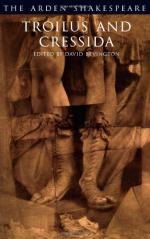|
This section contains 5,635 words (approx. 19 pages at 300 words per page) |

|
SOURCE: Domenichelli, Mario. “Renaissance Chivalry and ‘Handsome Death’ in Shakespeare's Troilus and Cressida.” In Shakespeare and Intertextuality: The Transition of Cultures between Italy and England in the Early Modern Period, edited by Michele Marrapodi, pp. 85-99. Rome: Bulzoni Editore, 2000.
In the following essay, Domenichelli alleges that in his cynical portrayal of the duel between Hector and Achilles in Troilus and Cressida, Shakespeare documented the end of the chivalric code in Renaissance England. In addition, Domenichelli states that by transforming the heroic Hector's death into a pointless and ignoble one, Shakespeare also overturned the traditional rules of tragedy.
Voltaire did not like Shakespeare. Certainly, as he wrote in his Lettre sur les Anglais, the English bard was “a vigorous genius, a fecund, a natural, a sublime genius”; however, unfortunately, he had “no notion of good taste, no knowledge of rules”.1 As Voltaire wrote D'Alembert in 1776, “cet abominable Shakespeare […] n'est...
|
This section contains 5,635 words (approx. 19 pages at 300 words per page) |

|


